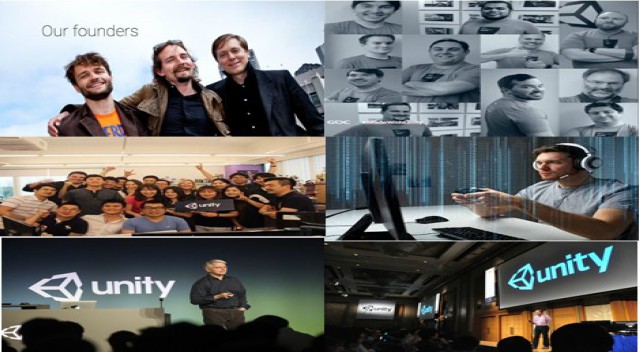
Unicorns 64/229 – Unity Technologies
Unity Technologies
Founders: Nicholas Francis, Joachim Ante, David Helgason
Key people: John Riccitiello (CEO), Joachim Ante (Co-Founder & Chief Technology Officer), Clive Downie (Chief Marketing Officer), Mike Foley (CFO), Elizabeth Brown (Chief People Officer) and Brett Bibby (VP of Engineering)
Number of employees: 501 – 1k
Unity Technologies is the creator of a flexible and high-performance end-to-end development platform used to create rich interactive 2D, 3D, VR and AR experiences. Unity’s powerful graphics engine and full-featured editor serve as the foundation to develop beautiful games or apps and easily bring them to multiple platforms: mobile devices, home entertainment systems,personal computers, and embedded systems. Unity also offers solutions and services for creating games, boosting productivity, and connecting with audiences including the Unity Asset Store, Unity Cloud Build, Unity Analytics, Unity Ads, Unity Everyplay and Unity Certification.
A few statistics includ e: · Unity owns more than 45% of the full feature game engine market (source: McKinsey) · There are more than 5M registered Unity developers · In every major market in the world, an overwhelming majority of the top-grossing 3D mobile games made with third party tools are made using Unity.
History
Unity Technologies was founded in 2004 by David Helgason (CEO), Nicholas Francis (CCO), and Joachim Ante (CTO) in Copenhagen, Denmark after their first game, GooBall, failed to gain success. The three recognized the value in engine and tools development and set out to create an engine developed in-house that any and all could use for an affordable price. Unity Technologies has received funding from the likes of Sequoia Capital, WestSummit Capital, and iGlobe Partners.
The company’s focus is to “democratize game development” and make development of 2D and 3D interactive content as accessible as possible to as many people around the world as possible. In 2008, with the rise of the iPhone, Unity was one of the first engine developers to begin supporting the platform in full. Unity now supports 24 platforms, including Oculus Rift, PlayStation 4 and Linux.
In 2010 IBM started exploring Unity 3D based browser plug-ins, as a way to access 3D virtual worlds from within a Web browser.
In April 2012, Unity reportedly had 1 million registered developers, 300,000 of which used Unity on a regular monthly basis. In April 2015, the number of reported registered developers reached 4,5 million, with 1 million monthly active users. 47% of all mobile game developers use Unity.
On 10 November 2010, the Unity Asset Store launched as an online marketplace for Unity users to sell project assets (artwork, code systems, audio, etc.) to each other. By April 2014, it had 600,000 registered users who downloaded about 500,000 assets per month. According to some estimates, this has saved game developers about $1 billion in the previous year.
Unity acquired Applifier, a mobile service provider, in March 2014. Applifier’s Everyplay, the game replay sharing and community service, became Unity Everyplay. The acquisition also meant that Applifier’s mobile video ad network, GameAds, became Unity Ads.
Two more acquisitions followed later in 2014: Playnomics, a data analysis platform for developers (now Unity Analytics), and Tsugi, who has been working on a continuous integration service, now known as Unity Cloud Build.
In October 2014, Helgason announced in a blog post that he would be stepping down as CEO with John Riccitiello, EA’s former CEO, replacing him. Helgason will remain in the company as Executive Vice President.
Unity acquired SilkCloud, a Shanghai-based ecommerce developer, in August 2015. SilkCloud is working on infrastructure for Unity’s web based services.
Unity held Vision Summit 2016 in February 2016, a VR/AR conference with the intent of “furthering the knowledge base of anyone developing virtual and/or augmented reality content”. At the event, Unity announced its partnership with Steam VR and Google Cardboard. The company’s VR/AR division, Unity Labs, was also announced alongside the in-VR scene editor.
At GDC 16, Unity announced two new product lines: Unity Certification to facilitate developers in demonstrating their skill and knowledge within Unity; and Unity Collaborate which allows multiple people to access the same Unity project remotely.

